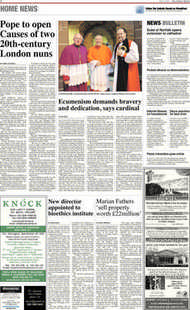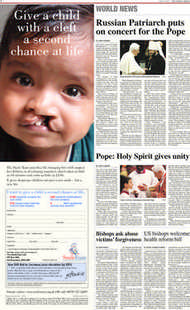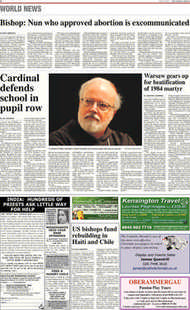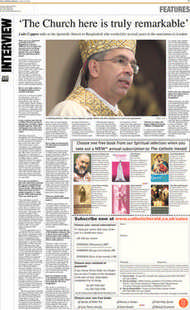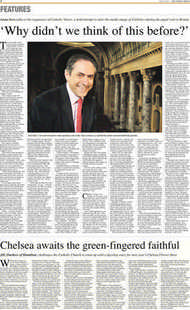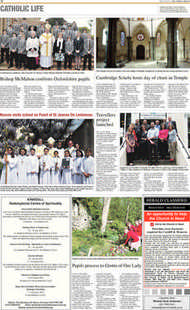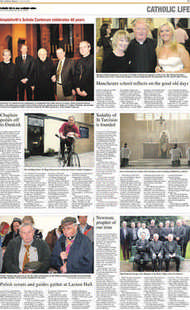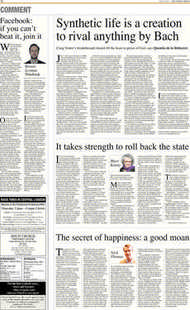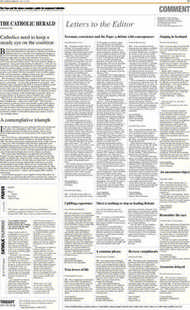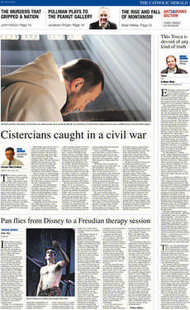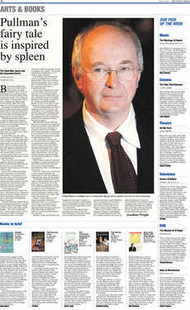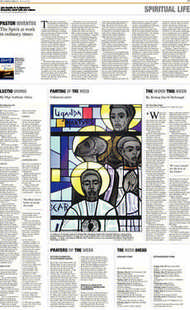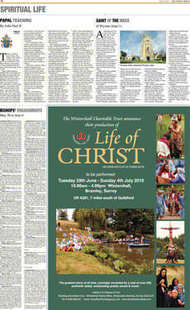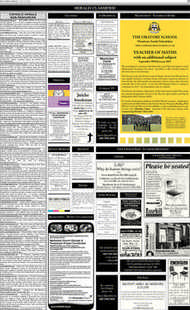Page 8, 28th May 2010
Page 8
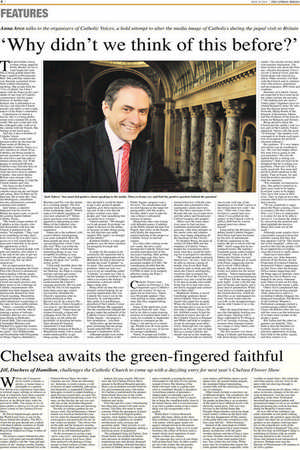
Report an error
Noticed an error on this page?If you've noticed an error in this article please click here to report it.
Tags
Share
Related articles
‘i Invite All Catholics To Support The Holy Father’
Vatican Watcher Sees Pope Sowing Seeds For New Life
Papal Visit To Britain To Go Ahead Despite ‘vile’ Foreign...
The Vatican Chief Who Will Lie For No One
Pope Urges Malta To Keep The Faith
‘Why didn’t we think of this before?’
Anna Arco talks to the organisers of Catholic Voices, a bold attempt to alter the media image of Catholics during the papal visit to Britain he personable young woman sitting opposite Emily Maitlis on Newsnight keeps her cool.
She is being grilled about the Pope’s speech at Westminster Hall. She carefully makes her way through a potential minefield without detonating anything. She avoids both the “I’m a Catholic but I don’t agree with the Pope on this one” staple of one type of Catholic commentator and the angry defence of another type.
Instead, she is informative as she lays out what the Church teaches and offers a clear explanation of the Pope’s comments.
A pharmacist or maybe a lawyer, she is a young professional with a normal life in the world. She goes to the pub with her colleagues after work or to the cinema with her friends. She belongs to her local gym.
And she is also a member of Catholic Voices.
This scenario could well become reality by the time the Pope comes to Britain in September. Catholic Voices is a new initiative in which 20 lay Catholics are being trained to answer questions, sit on panels, do interviews and take part in debates during the visit. If the project is successful British Catholics may find that they no longer have white knuckles when the news turns to matters Catholic. And non-Catholic Britons may emerge with a better understanding of what the Church teaches and why.
The faces on the Catholic Voices website (www. catholicvoices.org.uk) are bright and young. Most of them are in their late 20s to early 40s. They are theologians, consultants, lawyers, pharmacists, research scientists and mothers.
Jack Valero, a cheerful Spaniard who has lived in Britain for many years, is one of the guiding figures behind Catholic Voices.
“We found a huge number of Catholics in this country who feel dissatisfied with how the Church is portrayed in the media,” he explains. “They want to do something but they don’t know how to do it or don’t have access to it, but would like to learn and would like to be given the opportunity to do it.
“These are normal people with obs and families who realise it is the task of the laity to get out there and talk and say things in our own way, but say them attractively.” For an organisation that is dedicated to spreading the Good News the Church is notoriously bad at dealing with the media, especially in recent years. News stories about the Catholic Church are rarely positive and there seems to be a shortage of Catholic commentators who neither lose their tempers nor disassociate themselves from Church teaching. Meanwhile, organised religion as a whole, and Catholicism in particular, is the topic of fierce public debate.
Valero, a member of Opus Dei, came up with the idea of training a group of ordinary Catholics after he saw a disastrous debate at Methodist Central Hall. The event pitted Christopher Hitchens and Stephen Fry against the motion “The Catholic Church is a force for good”. Ann Widdecombe and Archbishop John Onaiyekan of Abuja, Nigeria, defended it. Hitchens and Fry won the debate by a crushing margin. The first question from the floor, directed at the archbishop, asked: “Which aspect of Catholic teaching are you most ashamed of?” Subsequent questions were similarly aggressive and jeering in tone. Many of the Catholics who attended were shaken by the experience.
Valero sat in the audience with a non-Catholic friend getting ever more animated. How did these people get away with saying things that weren’t actually true? Why was it that the Catholic side, which had such interesting things to say, was incapable of putting its case across? The debate, says Valero, shaking his head, was “awful, awful, awful”.
“I felt really horrible about the whole thing,” he says. “I remember thinking: the Pope is coming and this can only get worse.” Valero thought it would be good to find Catholics who could present the Church’s message positively. He was part of The Da Vinci Code response team three years ago, which successfully defended the Church’s reputation after its sinister portrayal in Dan Brown’s novel. In a nod to The Blues Brothers, Valero thought it was time to “get the band back together again”. Valero rang up Austen Ivereigh, a friend and colleague from The Da Vinci Code days, to talk about the possibility of reuniting the team. They phoned Dr Gemma Simmonds CJ and Abbot Christopher Jamison of Worth, a Benedictine monk with a considerable media profile, to get things going. After some talks they decided it would be better to get a new group of people together, give them media training and, in the event that the project worked, train more people and “start something that can really have a future”.
Valero explains: “We thought we’d ask around. Everybody we spoke to because of the debate, or because of other things going on, felt that this was really needed. Why hadn’t we thought of this before?” Kathleen Griffin, a writer and producer, was the third coordinator alongside Ivereigh and Valero.
In order for the project to be successful, the organisers felt it needed to be independent of the Hierarchy but that it also had to include the word “Catholic” in its name. This posed a canonical problem. There are only two ways to set up something called “Catholic” in canon law. One is for the bishops to establish it; the other is to receive the bishops’ permission, a process which takes a long time.
Being short on time the coordinators started looking for an existing organisation that was Catholic but wasn’t run by the hierarchy. In mid-December they spoke to Lord Brennan, president of the Catholic Union of Great Britain. He suggested that the coordinators brought the project under the umbrella of the Catholic Union. Catholics in the Public Square – the project’s first incarnation – was born.
Valero drew up the business plan, reckoning that the group would need £45,000 to see it through to September 2010.
Although people were enthusiastic about Catholics in the Public Square, progress was a bit slow. The coordinators had set mid-January as the target for going public with the project, but they didn’t want to take the step without a substantial amount of money.
Meanwhile, they were toying with different names. Catholics in the Public Square became Vox Populi, then Voice of the People, until finally the organisers started referring to the project as Catholic Voices in internal memos.
Five days after settling on the new name, the news came through that Catholic Voices had secured more than half of the necessary funding. After getting the first large sum, they have collected £30,000 and been promised another £15,000. The coordinators decided that the project would require another £10,000 in order to be properly effective during the Pope’s September visit.
Catholic Voices went public on February 2. The organisers gave Catholics across the country 10 days to apply for an interview. Valero says 80 people applied. They were getting so many applications that they stopped taking any more.
Some of the applicants were ruled out from the start. They had to be able to make training sessions in London three times a week, be available in September in order to comment on the Pope’s visit and be of a certain age. People over 40 were generally asked to give way in favour of younger candidates.
Valero, Ivereigh and Griffin tried to meet candidates before a formal interview with the coordinators and a journalist who conducted a mock interview. The Sky News presenter Colin Brazier did one set of interviews and the author and broadcaster Clifford Longley did another.
Valero says the main objectives were to find out how candidates performed under pressure, what their attitudes to the media were and whether they were happy defending all the teachings of the Church.
Fr Stephen Wang, the dean of studies of Allen Hall and the chaplain of Catholic Voices, helped the coordinators determine what they would be looking for in prospective members.
“We wanted people to present themselves,” he says, “and we’d be able to choose a group of people who loved their faith, would be able to think and talk about the Church intelligently, would be able to present the authentic life of the Church in a positive way and would be able to do that as people who could bring that alive and who were obviously engaged and committed to their faith.” Madeleine Teahan, a recent Cambridge graduate, heard about Catholic Voices from a friend who urged her to apply. When she first learnt about it she thought that it was an excellent idea. Catholic Voices, she felt, fulfilled a need. It had the potential to renew the face of the Catholic Church in England and Wales and help to communicate its message more effectively. Although she was apprehensive at first, she felt strongly that as a young Catholic she should step up to the challenge.
“Each person had an informal one-to-one with one of the organisers so we didn’t arrive at the formal interview cold,” she says. “After this, I was then invited to a panel interview, where I was grilled on the subject of the Church’s role in Africa, followed by a more general interview about myself.” Long before the Hitchens-Fry debate noted Catholic blogger Paul Priest had been frustrated by the lack of mainstream Catholics appearing in the media. He got in touch with the BBC, which suggested he recommend names. He started a Facebook group called Authentic Catholic Voices in the UK Media last October. Several months later Valero got in touch with Priest, suggesting that he get involved with Catholic Voices. He came down from Corby to London for the initial meeting – Valero mentioned the distance as a potential hindrance – but Priest felt the meeting had gone badly. Later, with the support of friends and family and a great deal of preparation, Priest went down to London again for the formal interview, which he describes as an unmitigated disaster. Several weeks later he was told, to his disappointment, that he didn’t make it on to the team.
Once the team had been chosen, the fortnightly briefing sessions began. Starting with a Mass celebrated by Fr Wang at 6.15 on Tuesday evenings, the sessions then featured experts on a range of what Valero calls “neuralgic issues”.
The first session was about being a Catholic and learning to talk about being Catholic in the media. The second session dealt with equality legislation. The third session was about the bishops’ election document, Choosing the Common Good, and the fourth dealt with clerical sex abuse. Other sessions will deal with the Church and its relationship with science, population and development, HIV/Aids and condoms.
Members of Catholic Voices are expected to have read up on the subject before the sessions. (“The reading lists are secret,” Valero jokes.) Speakers have included Michael Czerny SJ, who runs the African Jesuit Aids Network, Philip Booth of the Institute of Economic Affairs and David Quinn of the Iona Institute for Religion and Society.
Being positive about the Church and the media’s role is a key part of the Catholic Voices approach. Valero calls the tactic “re-framing”: the speaker is encouraged to re-frame each question to recognise the positive intention behind it.
He explains: “It’s very important before you do anything to say: ‘Do you feel happy about this man who is going to ask you questions? Are you delighted that he is asking you questions?’ And you have to be delighted that he is asking you questions. Then you will do a really good job. You must feel positive about speaking to the media. Then re-frame, try and find the positive question behind the question.
“For example, on homosexuality. The positive intention is: these guys want to be happy. Everyone wants to be happy. They have this issue in their lives. They’re right to have this concern and I have to connect to that concern.
“Or say somebody is angry about the Pope’s coming. I have to connect with that concern. Why is it? I have to understand it in order for me to be able to answer it. I re-frame the subject by answering the question and then highlight the positive things that come out of the issue.” Although some sceptics have voiced their concerns about the method, saying that they fear that speakers will be “like lambs led to the slaughter”, others are positive that that the project will be an opportunity to explain what the Church is really about.
There have been other criticisms, too. John Smeaton, director of the Society for the Protection of Unborn Children denounced Valero’s appearance on Sky News after the Foreign Office memo suggesting that the Pope open an abortion clinic during his visit to Britain was leaked to the press. Smeaton took Valero to task on his blog for describing the memo a joke.
Others have complained that the team is not diverse enough while others have said it is excluding Catholic bloggers for being too incendiary. Pat Brown of the Catholic Women’s Ordination campaign started a counter-group called Catholic Voices for Reform after she was told her stance on the ordination of women went counter to the project’s goals.
But Valero and the other organisers are hopeful. They believe that the members of Catholic Voices will have a precious opportunity to bring their faith to the public square and bear witness to it.
blog comments powered by Disqus



